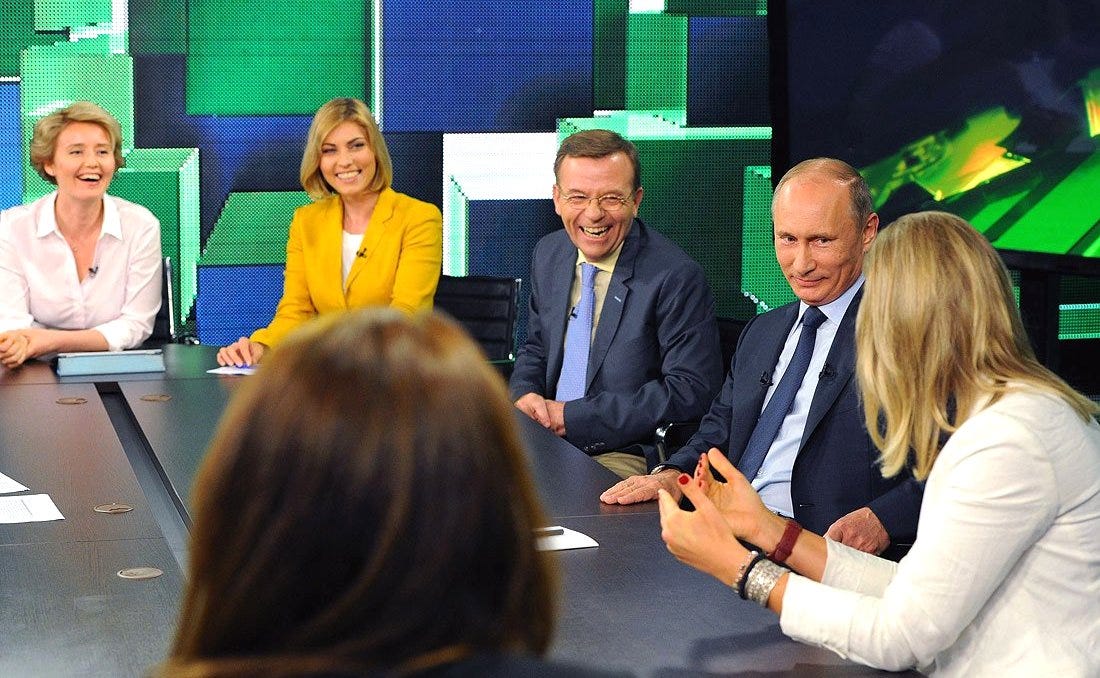The Americans helping Russia’s influence operations in the U.S.
Russia has been courting, and fooling, Americans for decades
In 2015, less than a year after Russia seized Crimea from Ukraine, I was working in the U.S. State Department, on a small team tasked with debunking Russia’s onslaught of disinformation. One day, I read an American man’s blog entry about how Russians had approached him, offering to pay him and to give him some ideas and articles.
At the same time, a friend of mine had naively applied to a job at Russian state broadcaster RT, which has spewed a steady stream of Kremlin disinformation and propaganda into the U.S. under the guise of journalism. My friend had even gotten a call from RT’s now sanctioned top editor, Margarita Simonyan, before deciding she wouldn’t move forward with RT’s “opportunity.”
Sitting in my office chair, the marble Lincoln Memorial on the National Mall in sight, I had no idea what these small moments would portend. But here we are, less than a week away from an election rife with foreign and domestic disinformation, and a series of Americans have been outed for their role in Moscow’s influence operations. It is a spectrum that ranges from the witting to the willfully ignorant to the completely unaware.
John Mark Dougan, a former deputy Palm Beach County sheriff and U.S. marine, received funding from Russia’s military intelligence service, the GRU, according to intelligence documents obtained by The Washington Post journalist Catherine Belton. Dougan ran several fake news websites, and he appears to have first falsely claimed that Democratic vice presidential nominee Tim Walz abused a high school student before a phony video went viral. Dougan has denied being connected to the GRU.
“He’s not as important as he’s made out to be,” Darren Linvill, an expert on social media disinformation at Clemson University, told me. “He’s not some kind of mastermind. We only know his name because Russia wants us to know his name. It’s politically convenient.”
Other Americans — including right-wing influencers with social media followings in the millions — say they didn’t know they were being funded by RT, which was dropped by U.S. distributors after Russia’s 2022 invasion of Ukraine. “I as well as the other personalities and commentators were deceived and are victims,” said Tim Pool. “I knew absolutely nothing about any of this fraudulent activity. Period,” said Dave Rubin. “Myself and other influencers were victims in this alleged scheme,” wrote Benny Johnson. An indictment describes how some were fooled, with RT employees resorting to fake personas and shell companies.
More Americans spread Russian disinformation online without knowing it. “Tens of thousands are unwitting supporters when they hit ‘repost,’” Darren said.
All of it reminds me of what Bill Evanina, then-Director of the National Counterintelligence and Security Center, told me before the 2020 election and the January 6 riot. I had asked him, "What is the biggest foreign threat that you’re worried about right now?" He said, “The American people… the useful idiot times a thousand now.”
It is unclear when Russia’s use of Americans truly began, but the tactic goes back at least four decades.
“I started looking at this stuff in 1987, and they were certainly doing it in the 1980s,” says Todd Leventhal, a retired Russian disinformation expert and my former boss on that tiny State Department team. “That was when the U.S. government as a whole started paying attention to Soviet active measures, which is covert influence operations,” now called measures of assistance.
He says in the 1980s, the Soviets used an American named Robert Strecker, who claimed that AIDS was man-made. He became one piece in a tapestry of fabricated narratives asserting that the U.S. had created AIDS as a bioweapon. They also used conspiracy theorist Lyndon LaRouche, who often ran for president, in addition to British and (East) German scientists. Americans were their favorite, Todd said.
“They're a convincing prop,” he told me. “If it's Russian voices, the self-interest is obvious — they're saying these anti-American things, ‘Of course, what else do we expect?’ So it's more easily discounted. If Americans are saying it, [people] say, ‘Wow, here's a guy defying his own government or criticizing his own government, let's take a closer look.’”
The Russians also recognized another major perk in featuring Americans voices. “People in the government tend to be hyper-cautious about criticizing Americans,” Todd said. “You shouldn't go after Americans because of free speech.”
The AIDS-as-an-American-bioweapon narrative died out with the passage of time and the Soviet Union’s economic and geopolitical weakness, he says. “[Mikhail] Gorbachev adopted a new policy called new political thinking. And the core of it was that they should eliminate the image of the enemy because that would be the most effective way to undercut U.S. military spending and hardline policies against the Soviet Union.” So the Soviets, after forming Department D for disinformation under the KGB in 1959, which then shifted to Department A for active measures in 1966, eased up in the late 1980s.
Conveniently, there was also no social media. “In 1984, the main KGB theme was ‘Reagan means war,’ we've learned from defectors who have come over,” Todd says. “You go back and search for that, you'll find nothing or next to nothing because nobody picked it up. That was before the Internet, before social media.”
Which brings us to Vladimir Putin, whose rule was threatened not only by the free press, but by the free-flowing information of the Internet age. The former KGB officer understood what he had to do. He got new people to harness the old tactics. And Russian disinformation thrived online in ways he may never have even dreamed were possible. The Russians “tried to intervene in every single U.S. presidential election from 1952 onward, with practically no impact until the age of social media,” Todd told me.
The U.S. intelligence community has assessed that Russia is the “preeminent and most active foreign influence threat” in the 2024 election. Along with Iran and China, Russia is better prepared to exploit uncertainty and chaos after Election Day, “in part because of the lessons drawn from the 2020 election cycle,” one intelligence official said in a recent press briefing I attended. The official warned that Russia may use covert influence to foment violent protests.
But despite the proliferation of disinformation, and the Americans taking part, there is still no way to measure its impact. Todd doesn’t think that matters. “The Russians don't think of it in terms of, ‘Does this have a big impact?’ And if it didn't, ‘Maybe we shouldn't do that. They look at it in terms of the cumulative impact of thousands of different operations over decades.”








Russia should put that energy into helping her own citizens. Can you imagine how much time and money have been poured into this for decades?
It’s sad that the Americans plead “gosh I didn’t know” .. cuz I am not buying any of it .. how f’ing stupid do they think we are .. they are blinded by the money .. and plead innocent .. I for one say they need to be held accountable for their actions ..